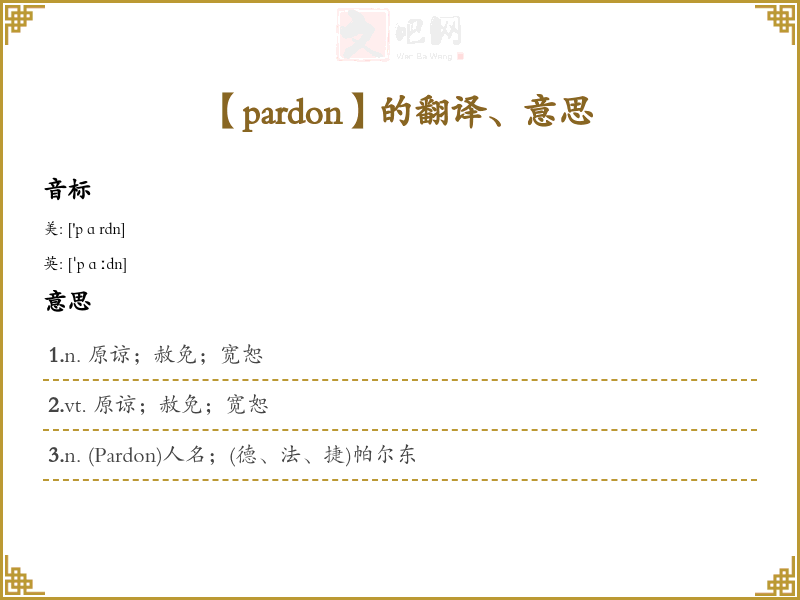【pardon】的翻译、意思
时间: 2025-04-26 13:15:39
【pardon】怎么读
美:['pɑrdn]
英:[ˈpɑːdn]
【pardon】是什么意思、字义解释
1. n. 原谅;赦免;宽恕
2. vt. 原谅;赦免;宽恕
3. n. (Pardon)人名;(德、法、捷)帕尔东
【pardon】的详细解释
英文单词学*与分析:[pardon]
1. 基本定义
- 字面意思:Pardon 的字面含义是“宽恕”或“原谅”,通常用于请求对方原谅自己的错误或不当行为。
- 词性:名词(pardon)和动词(to pardon)。
2. 词源与起源
- 词源分析:Pardon 源自古法语 "pardoner",意为“宽恕”,而这一词又源于拉丁语 "perdonare",由前缀 "per-"(完全)和动词 "donare"(给予)构成。
- 历史背景:该词在英语中的首次记录可追溯到13世纪,用于法律和**的宽恕场景。
3. 使用场景
-
正式与非正式语境:
- 在正式场合中,pardon 通常用于法律和**语境,如法院中的宽恕或对罪犯的赦免。
- 在非正式场合中,pardon 可以用于日常对话中表示请求他人原谅或者打扰,例如:“Pardon me, could you repeat that?”
引证解释:在莎士比亚的戏剧《暴风剧》中,角色使用“pardon”来请求宽恕或原谅。
-
特殊场合:
- 在法律领域,“pardon”指的是政府对某人刑罚的免除。
- 在科学或医学中,虽不常用,但可用于表示对某种行为的宽恕或原谅。
4. 示例句子
-
“I ask for your pardon for my late arrival.”
- “我请求您原谅我迟到。”
-
“The president granted a pardon to the convicted felon.”
- “总统对被定罪的罪犯给予了赦免。”
-
“Pardon my interruption, but I have a question.”
- “打扰一下,但我有个问题。”
-
“In the eyes of the law, a pardon can restore a person’s rights.”
- “在法律面前,赦免可以恢复一个人的权利。”
-
“She said, 'Pardon me, but I believe you dropped this.'”
- “她说,‘抱歉,我相信你掉了这个。’”
*. “He was seeking a pardon for his past mistakes.”
- “他在寻求对自己过去错误的宽恕。”
-
“Pardon the mess; I’ve been cleaning out my closet.”
- “请原谅这混乱;我一直在整理我的衣柜。”
-
“Pardon my French, but that was a terrible mistake.”
- “请原谅我的法语,但那是个可怕的错误。”
5. 同义词与反义词
-
同义词:
- Forgiveness:更强调内心的宽恕和释怀。
- Excuse:通常用于较轻微的错误或不便,与“pardon”相比更为口语化。
-
反义词:
- Condemnation:指强烈的谴责或指责,通常不涉及宽恕。
- Punishment:指对错误或罪行的惩罚,与“pardon”形成对比。
. 学方法
- 音标记忆法:/ˈpɑːrdən/,可以通过分解音节来记忆,比如“par”(巴黎)和“don”(给予)相结合。
- 谐音联想记忆:可以联想“pardon”发音类似于“怕顿”,想象害怕某种后果而请求宽恕。
7. 关联词汇
- pardon me: 用于请求原谅。
- presidential pardon: 总统赦免。
- pardon request: 赦免请求。
- granted pardon: 已被给予的赦免。
通过以上的分析和示例,学*者可以更全面地理解和运用“pardon”这个词汇。
【pardon】例句
1、[[口语]] You say Pardon?, I beg your pardon?, or Pardon me? when you want someone to repeat what they have just said because you have not heard or understood it. (表示没有听见或不明白,请求重说一遍) 对不起
-
例:"Will you let me open it?"—"Pardon?"—"Can I open it?"“让我来打开它,好吗?”——“对不起,你说什么?”——“我能打开它吗?”
2、[[口语]] People say "I beg your pardon?" when they are surprised or offended by something that someone has just said. (表示惊讶或者受了冒犯) 什么
-
例:"Would you get undressed, please?"—"I beg your pardon?"—"Will you get undressed?"“请你脱下衣服,好吗?” —“什么?”—“你能脱下衣服吗?”
3、[[口语]] You say "I beg your pardon" as a way of apologizing for accidentally doing something wrong, such as disturbing someone or making a mistake. 对不起
-
例:I beg your pardon. I thought you were someone else.对不起,我把你当成别人了。
4、[[口语]] Some people say "Pardon me" instead of "Excuse me" when they want to politely get someone's attention or interrupt them. 对不起 (以引起注意或者打断一下)
-
例:Pardon me, are you finished, madam?对不起,您好了吗,太太?
5、[[usu passive]] If someone who has been found guilty of a crime is pardoned, they are officially allowed to go free and are not punished. 赦免
-
例:Hundreds of political prisoners were pardoned and released.许多政治犯被赦免和释放了。
6、[N-COUNT] Pardon is also a noun. 赦免
-
例:They lobbied the government on his behalf and he was granted a presidential pardon.他们为他游说政府,他因之得到了总统特赦。
